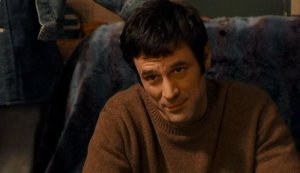Completed on his deathbed in 1998, Jerome Bixby's screenplay for The Man From Earth takes place in a single room with a cast of eleven, only eight of whom contribute substantial dialogue. Cinematically it is not daring. There are few, if any, camera tricks and zero special effects. Its director, Richard Schenkman, does not set out to do much other than capture the discourse in the living room of John Oldman (David Lee Smith). Music in the film is scant as that would only detract from the words being exchanged on screen. There are no action sequences, and only one true moment of drama down the film's stretch. Given all these observations, I was surprised to find that The Man From Earth was not originally intended for the stage.
The story that provides the impetus for the conversation is this: John Oldman is moving after serving 10 years on the faculty of an unnamed university. His academic colleagues, professors from the fields of archaeology, anthropology, art history, biology and psychology, have come over to his home to wish him goodbye. Everything he owns is boxed up minus the furniture and so once everyone has arrived he breaks out a bottle of Johnny Walker to entertains his guests. The question on the minds of everyone he has invited eventually surfaces: Why is he moving on? He insists that there is no reason, that he's done this before and that he prefers a change of scenery every decade or so. His feeble answer only fuels the flame of their unrelenting curiosities until they begin to wonder if something is wrong. It is soon after that John decides to do something he recollects only having ever done once before in his lifetime - tell others the truth.
John was born in the time of caveman (he is a Cro-Magnon to be exact) approximately 14,000 years ago. To date he has survived the times and has witnessed pre- and modern history. His memory of wordly events is limited in proportion to the way we can recall our past. For example, when challenged by Edith (Ellen Crawford) to recall where he was in 1292 AD, he coolly asks where she was a year ago on this date. This is just one bullet of the bulky Q&A session that ensues. Just as fascinating to watch as John's ability to answer every question and foil the numerous attempts to trip him up in his "story" is how each member of the farewell party reacts in their own right to what it is he has to say.
 |
| David Lee Smith as John Oldman |
Before John presents his secret as truth, he disguises it as a theoretical work of science fiction he may write up, and asks his friends for their input. They play along, searching for all the different ways an author must bend the corners, toying with the bounds between the possible and impossible. Shortly thereafter, once he discloses this concept as his actual biography, their respective rapports with him change and so do their moods. But as viewers of a movie, we are left behind at this first stage of knowing that what we witness is science fiction. As the proverbial fly on a wall then, we can appreciate the creativity that went into Bixby's writing John's story, but the truly fascinating stuff in The Man From Earth are those observations we can draw on regarding human nature based on the room's versatile dynamics.
While it is clear that Bixby never sought to utilize cinema's full potential in his final screenplay, The Man From Earth is an intrinsically galvanic script that lends itself to all kinds of great takeaways for its audience. It should also not go without saying that David Lee Smith's portrayal of John Oldman is adeptly done, and at times chilling. His calm demeanor and understated performance gives off an aura of aged sagacity. Paired with his bottomless bag of answers it make for the perfect 14,000 year old racanteur. So watch The Man From Earth and try, for a stretch, to envision yourself in that room. More important than any question you could pose to John is the one single question the film poses to you:
How would you react?
--Review by Mike Dorfman

No comments:
Post a Comment